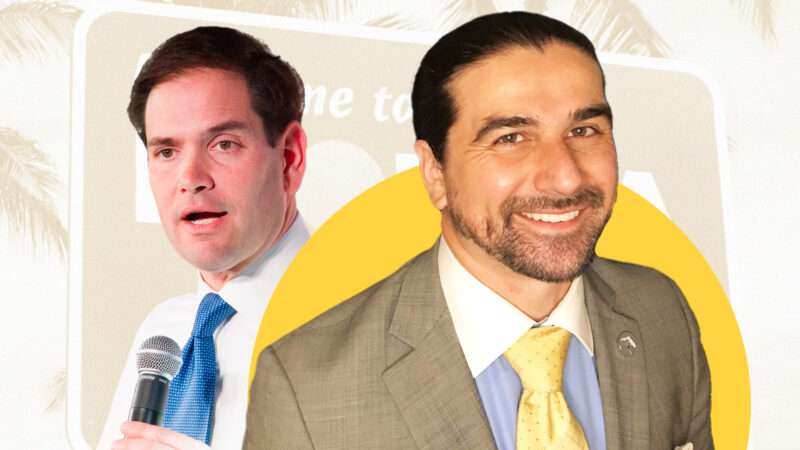
When Florida holds its primary elections on Tuesday, the Senate races are likely to be the least dramatic: The incumbent, Sen. Marco Rubio, is running unopposed in the Republican primary, and Rep. Val Demings, who currently represents the state’s 10th Congressional District, is polling at 80 percent in the Democratic primary.
Despite the relatively low stakes, the race is still likely to garner attention: Rubio, who ran for president in 2016, faces a tough potential opponent in Demings, who was famously on the short list for President Joe Biden’s potential 2020 running mates. A University of North Florida poll this month showed Demings with a four-point lead over Rubio, 48–44. And in an election year when Democrats could defy historical trends and keep control of the Senate, every close race will be under intense scrutiny.
One person who is counting on that extra attention is Dennis Misigoy, the only Senate candidate from Florida’s Libertarian Party. Speaking with Reason earlier this month, he made the case for a third-party candidacy. He also criticized both of his likely future opponents, but reserved particularly strong words for the incumbent.
“Rubio is pretty uniquely bad,” says Misigoy. “Not just in the sense of being unpopular and easy to dislike, but policy-wise: This is a guy who got elected as part of that Tea Party wave back in 2010, and…when you listen to him talk about dealing with issues of economic policy, it’s all central economic planning, it’s not free markets.”
In an age when socialism seems ascendant among younger Democrats, and Republicans position themselves in full-throated opposition, Misigoy sees little difference between Rubio and progressive icons like Sen. Bernie Sanders (I–Vt.) or Rep. Alexandria Ocasio-Cortez (D–N.Y.).
“I would characterize him, by the Republican standards, as a socialist. Is he a socialist by the means of, ‘seize the means of production and nationalize everything,’ socialist? No. But is he socialist by the ‘Obamacare is socialist’ standard? I’d say, yeah.”
Not that Rubio is necessarily an outlier in the GOP, in Misigoy’s view. “Republicans have long presented themselves as the champions of fiscal responsibility, smaller government, and whatnot,” he says. “I really got turned off to them in the first part of the 2000s…George W. Bush was president for eight years. For six of those eight years you had Republican majorities in Congress, and what’d they do with the spending, and the growth of government?”
Misigoy is the son of immigrants, including a mother whose family fled Cuba immediately after the 1959 revolution in which Fidel Castro overthrew military dictator Fulgencio Batista and installed a Communist regime. Notably, Rubio initially claimed the same about his own parents and has used his family’s experience as fuel for his own anti-Communism. But in 2011, The Washington Post reported that Rubio’s family had actually left in 1956, not as economic refugees but as traditional immigrants. (Misigoy clarifies, “I don’t begrudge anyone for being an economic refugee, but obviously when you then take [such] different positions on immigration policy, then there’s a different wrinkle to that.”)
In contrast to both Republicans and Democrats, Misigoy hopes to bring an actual sense of fiscal restraint to the Senate. In 2016, he ran successfully for a spot on the board of supervisors for a Miami-Dade County Community Development District (CDD). A CDD, as defined under Florida law, is a “local unit of special-purpose government” formed for “specialized functions.” Misigoy says the experience gave him a sense of what a term in office would really be like as a third-party candidate: “I spent two years where any motion I made died for lack of a second, unless it was to adjourn a meeting or to approve minutes.”
But in leading by example, he says he was able to convince other like-minded citizens to run for office as well. “We had a new majority after the 2018 midterms, and we were able to do a lot of things differently: We had a slate of wasteful projects, [and] we were able to save the district 78 percent of what had been allocated for those projects.”
Misigoy has a lengthy list of policy proposals, from a more restrained foreign policy to repealing the Davis-Bacon and Jones Acts. But speaking to Reason, he focused largely on inflation and government spending.
“The most widespread negative impact [of government policy] is inflation. Inflation is affecting everybody in this country” in the form of higher prices, he explains, “and all of that is the consequence of the monetary policy and the fact, in particular in the COVID era, that we’ve been printing trillions” of dollars.
Misigoy accuses both parties of going along with it, either with the “tacit approval” of preserving the status quo, or more overtly, as when Demings tweeted in February that “the Federal Reserve is the most important institution in America in the fight against inflation.“
“I got a laugh out of [that],” says Misigoy. “Obviously, we have a little bit of a different perspective: The monetary policy we have is causing all these problems…Creating money doesn’t mean that you’re actually creating something new, it’s stealing the wealth from the money people already have in circulation…Their bank account looks the same, but the value is not the same.”
“We want the market to be as efficient as it can be, because an efficient market delivers goods and services to people at the lowest cost possible, lowers the cost of living, overall that makes it easier for people to live, and it leaves more capital left over for people to create new things that improve people’s lives further.”
This article includes reporting from Alyssa Varas.
The post Marco Rubio's Libertarian Challenger Blasts the Senator as a 'Socialist' appeared first on Reason.com.
from Latest https://ift.tt/yioa2bU
via IFTTT